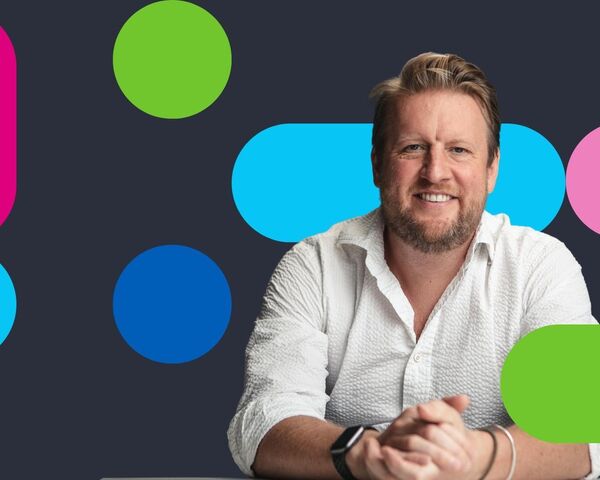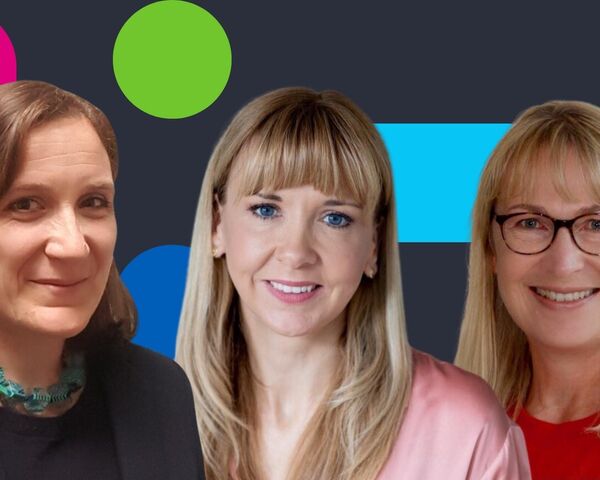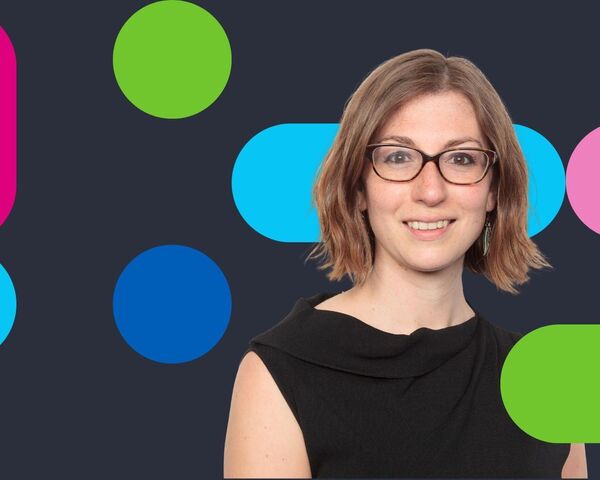10 highlights from 10 years of Genomics England
By Chris Wigley on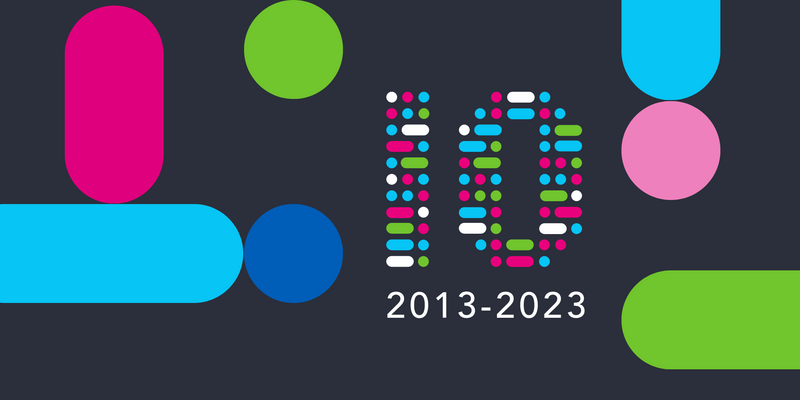
Over the past decade, Genomics England has made huge strides towards our ambitious mission to “bring the benefits of genomic medicine to everyone”.
It's been 10 years since Genomics England was founded to deliver the 100,000 Genomes Project – a hugely ambitious “moonshot” science project. The first human genome draft had only been completed a decade before at an enormous cost, so the scale of this ambition was huge. But by working in partnership with the NHS, Illumina and many others, we were able to reach our goal of sequencing 100,000 genomes in 2018.
Since then, we’ve evolved from a project team to a sustainable and scalable organisation. Today we continue to deliver our mission at the forefront of the UK’s world-leading genomics ecosystem.
As I look back on 10 years of Genomics England, I felt it fitting to highlight a ‘top 10’ from the past decade.
1. Setting our strategy
Our work as an organisation can be divided into 2 arms: healthcare and research. When I joined Genomics England back in 2019, I helped develop a way to articulate our strategy to the wider world. The result? The genesis of ‘the infinity loop’.
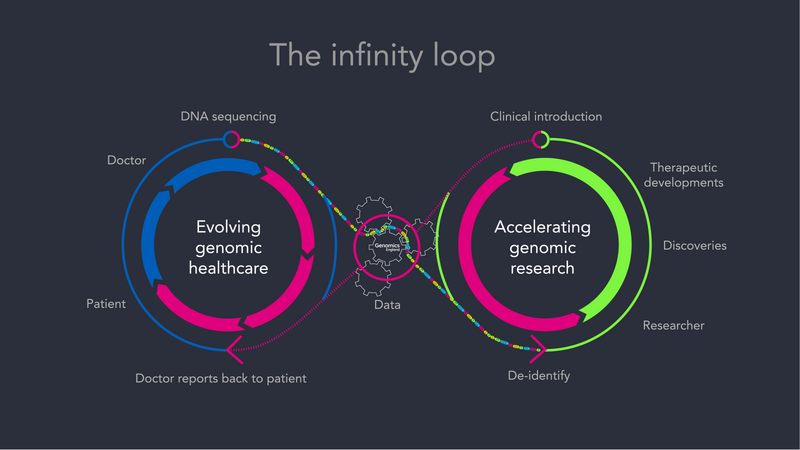
The infinity loop (much improved from my first sketch on a whiteboard) shows our place in the ecosystem.
We sit at the intersection of healthcare and research, and the infinity loop shows how we foster this collaboration to deliver results for patients and research participants. Our approach ensures that healthcare data feeds into research, and in turn, that research generates new insights to improve diagnoses and treatments for NHS patients.
The insights and data we generate also stretch beyond the loop, into the wider genomics ecosystem, including healthcare providers, regulators, research organisations and biobanks both nationally and internationally.
Watch our strategy video, featuring the infinity loop, of course!
2. Steering the 100,000 Genomes Project
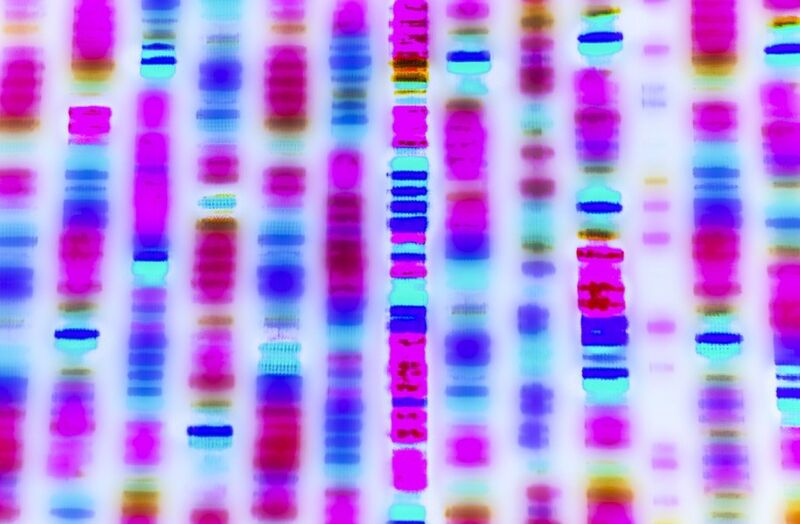
This project kickstarted the whole journey we’ve been on over the last 10 years.
It was the initial vision of then Prime Minister David and Samantha Cameron and their family. They turned their learnings and experiences of caring for their son Ivan, who had a rare condition known as Ohtahara syndrome, into the driving energy behind this extraordinary project.
Along the way the project was driven and guided by many others not all who I can mention here, but some key people include Professor Sir John Bell and Dame Sally Davies who played a vital role in in shepherding Genomics England into existence and Professor Sir Mark Caulfield and Professor Dame Sue Hill, who both received honours for the incredible work they did to deliver the 100,000 Genomes Project.
Building national systems, generating and using data for clinical impact at national scale, are not trivial achievements. As context for “our” decade, it’s worth recalling the efforts of the Human Genome Project.
Only another 10 years before we were founded, to sequence one genome took $2.3 billion, extensive global cooperation, and many years of work before wrapping up in 2003. (To learn more about that, listen to my upcoming G Word podcast with Francis Collins, one of its founding leaders.)
Therefore, getting the 100,000th genome sequenced in December 2018 was a real landmark moment, and a testament to all the doctors, scientists and clinical teams, and most of all the patients and participants who took a leap into the unknown together.
3. Launching whole genome sequencing in the NHS
The left-hand side of the infinity loop – ‘evolving genomic healthcare’ – was realised when whole genome sequencing became part of the healthcare service via the NHS Genomic Medicine Service (NHS GMS).
We recently reached the milestone of having helped tens of thousands of patients providing genomic insights and diagnoses in partnership with the NHS GMS. This is a world-first, and we’re incredibly proud to have been part of making that happen.
I’d like to thank all our NHS colleagues both in the central teams, across clinical academic specialties, and in the regional laboratories for helping us to deliver this vision every single day.
Transforming healthcare is hard but we’re transforming it together. And we know that the only way patients can get the best insights is if all the data is available to draw from. Frontline clinicians are also on the journey with us with thousands now having ordered whole genome sequencing tests via the NHS GMS.
We know the system is under pressure, and that many patients are waiting too long to hear back about their results, but we also know that when the whole system is in sync, we can provide answers within clinically relevant timelines.
We must continue to work together for patients up and down the country.
4. Creating a world class genomic research asset
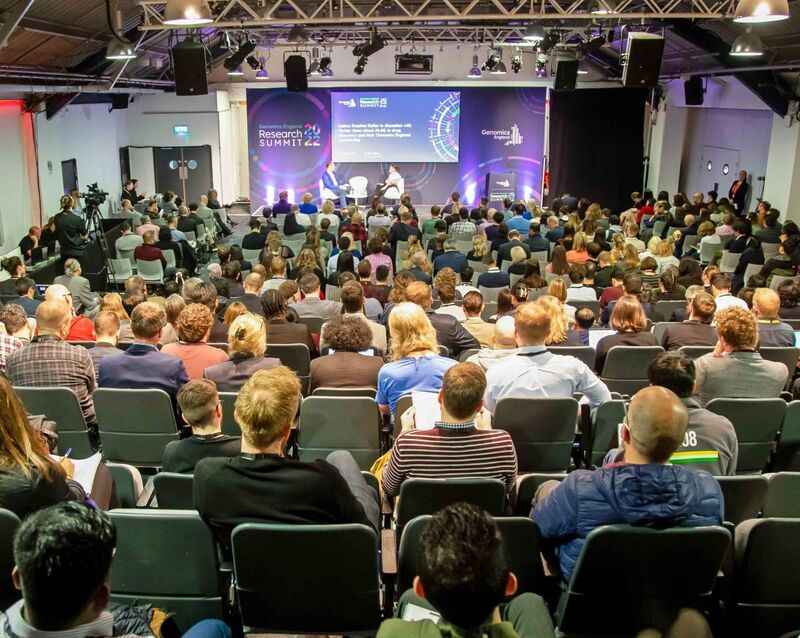
The main stage at our Research Summit in May 2022.
A critical element of the vision for the 100,000 Genomes Project was that it would drive both clinical outcomes and generate an extraordinary research asset.
Keeping detailed individual genomic data secure and private while allowing research work to flourish was a tricky conundrum, and one that needed a lot of robust and innovative ethical thinking.
Professor Mike Parker was a driving force in developing the systems and continuing to help us keep our data both accessible and secure today while achieving impact.
Groundbreaking research comes through our Research Environment to allow the development of new drugs and therapies and generate evidence for new clinical diagnostics and therapeutics.
So while research is a major focus, our goal remains: to bring benefits to the patients and participants we serve.
To give one example, cancer research led by Professor Serena Nik-Zainal and team from Cambridge University Hospitals (CUH) and the University of Cambridge created a new understanding of the mutational profiles of tumours, enabling an advanced approach to characterise tumours and personalise cancer medicine. This work won Serena the Dr Josef Steiner Cancer Research Prize, which is like the Nobel Prize for cancer research. We couldn’t be prouder of enabling that work.
5. Bringing healthcare and research together at the ‘X’
The magic of the infinity loop is what happens at its intersection, ‘the X’, when healthcare is driving research and vice versa.
Indeed, Serena’s work in cancer is being built into operational patient data analysis tools. And going the other way, we’re now getting NHS GMS data to flow back into the Research Environment.
This hasn’t been easy and has taken a lot of time and effort, but we know the hard work is worth it because this is where the magic happens.
6. Continuing to discover new diagnoses for patients
Perhaps the most directly impactful activity happening at ‘the X’ is our effort in genome analysis, which we call diagnostic discovery.
This our “dream factory”, where staff at Genomics England (helped by researchers in both our academic and industry research communities!), try and uncover new answers for those patients who don’t get a primary diagnosis first time round.
Well over 2,000 diagnoses have now been returned via this route – and you can read more about our diagnostic discovery work in our recent blog from Dr Suzi Walker, Head of Translational Genomics at Genomics England.
7. Responding to COVID-19
There was perhaps no clearer example of pulling together than the ecosystem’s response to COVID-19, and we were pleased to play our part.
Through the GenOMICC COVID-19 study, in partnership with the University of Edinburgh, we were able to identify how genetics plays a role in why some people are more severely affected than others. We helped identify both pathways and existing drugs, such as Baricitinib, that could be repurposed to treat severe COVID-19 infections.
8. 9. and 10. Setting up our new initiatives

Thanks to continued support and funding from the Department of Health and Social Care, we’re now in a position where we can continue to scale our core efforts as well as launch 3 iconic new initiatives.
These initiatives – Cancer 2.0, Diverse Data and the Newborn Genomes Programme – are working to bring us closer to a future where everyone can benefit from genomic medicine.
Our Cancer 2.0 programme aims to validate novel research-based approaches to understanding and treating this devastating disease – using new technologies like long-read sequencing, new datasets like high-definition pathology imaging, or new approaches like personalised cancer vaccines.
The Diverse Data initiative, looks to address the chronic under-representation of many communities in genomic research datasets. This initiative is about engagement and listening as much as it’s about data and science.
Perhaps the most ambitious of our new initiatives though is the Generation Study being delivered by the Newborn Genomes Programme. The NHS-embedded research study aims to sequence the genomes of over 100,000 newborns to look at the effectiveness of using whole genome sequencing to find and treat rare genetic conditions in newborn babies.
It will also support vital healthcare research to enable better diagnostics and treatments to be developed and explore the potential benefits of safely and securely storing a patient’s genome over their lifetime to help predict, diagnose and treat future illnesses.
Together, the 3 elements of this research study will provide an amazing set of insights and capabilities to shape the way healthcare is evidenced, supported and delivered. In that sense it’s more like a 100-year project. From 100,000 genomes to 100 years of impact. It doesn’t get more exciting than that.
As I reflect on our achievements over the last decade, it’s clear that our successes have been achieved through strong partnerships with participants, the NHS, our research community, our sequencing and technology partners, and the wider genomics ecosystem. We are incredibly grateful to all those who have supported us on our journey so far.
To change the way healthcare is designed and delivered, we must continue to work together.
It’s been a truly incredible decade. I very much look forward to seeing how Genomics England continues to play a critical role in the next decade of genomics and beyond.
About the author
Chris Wigley is the CEO of Genomics England. Through the COVID crisis Chris was seconded as Senior Responsible Officer for Data to NHSX, and Genomics England launched a major research programme into the genomic drivers of severity of response to COVID.
Chris was previously COO at QuantumBlack, a bespoke machine learning and AI technology company, and a Partner at McKinsey working on technology strategy topics. He is a trustee of the New Entrepreneurs Foundation, and on the Advisory Board of deep-tech VC Entrepreneur First. He previously worked for the UK Foreign Office, establishing and leading analytical work at the Counter Terrorism Policy Department to counter chemical, biological and nuclear terror threats.
